Text
“you have to stop buying every mug you think is cute” what’s that? i can’t hear you over the sound of all my mugs clinking together in the cabinet as i try to find space for this new mug i bought
82K notes
·
View notes
Text

Loved the board in research class today.
#back to school#studyblr#studying#study aesthetic#study tips#studyinspo#college#school#study hard#study motivation#studygram#studyspiration#studystudystudy#desksetup#my desk#deskdecor#class#classroom
18 notes
·
View notes
Text

I procrastinated all my homework this weekend, so it must be done today. I have to read the third chapter of my art history textbook and take a practice quiz, read the third chapter of my research methods textbook, read some math and take a quiz, and do a week’s worth of abnormal psychology notes/activities. Ahhhhhhh! Wish me luck.
#back to school#studyblr#studying#study aesthetic#study tips#studyinspo#college#school#study hard#study motivation#studygram#studyspiration#studystudystudy#desksetup#my desk#deskdecor
8 notes
·
View notes
Text


I am committing a lot of study sins in this scenario— studying in bed, drinking an energy drink at midnight, listening to unfamiliar music with lyrics… Sometimes you just have to, haha. It’s been a rough day and I was bummed out about having to stay up to complete homework, so this was a compromise I had to make with myself!
I’m not particularly opposed to showing my face online but is that even something people do on Tumblr? Plus creepy people exist everywhere haha.
#back to school#studyblr#studying#study aesthetic#study tips#studyinspo#college#school#study hard#study motivation#studygram#studyspiration#studystudystudy#desksetup#my desk#deskdecor
11 notes
·
View notes
Note
How do you maintain discipline and motivation?
Hi!!!
So excited for this question. The truth is that I’m not always motivated. However I have systems set in place for discipline.
Goal system
I have this flash card that has my top 5 goals. I take it everywhere with me and I keep it where I can see it. Even on days when I don’t feel like doing anything it reminds me of my purpose.
Planner
To-do list
Tracker
SPIRE system
I learned it from a YouTube video I watched and it stands for Spiritual, Physical, Intellectual, Relational, and Emotional. I do an activity for each everyday and it keeps me balanced.
Spiritual: pray, meditate
Physical: workout at least for 5 minutes, take a walk.
Intellectual: read at least 10 pages and try to take notes of what you learned even if it's just 2 sentences.
Relational: Go out and observe people, start from observation, then talk and sometimes you could learn something or even express yourself more.
Emotional: Journaling helps, write down what you want at the beginning of the day then write how your day went
The most important is starting small, be consistent, and have a way to track yourself and the discipline will come.
Mentorship system
I have mentors that I have not met or even know me. My mentors are Oprah (creativity), Mellody Hobson (career), Naomi Campbell (body), Amal Clooney (intellect), and Jackie Kennedy (Elegance). Listening to these women, watching them succeed, or speaking makes me want to get myself together. These are my invincible mentors. These are my go-to people when I feel down or I find myself slacking.
Why system
I always ask myself why. I use 20 minutes a day to ask myself why I need to wake up at 4am, study, work out, network, or eat healthily. The answers I give myself immediately give me a boost.
When you ask yourself why, it makes you...
Plan ahead.
Prepare to succeed.
Develop a growth mindset.
Community System
Join a community or create one where discipline is appreciated and valued. Like you are currently doing through Tumblr. To be honest, that is why I am here. To create a community that will keep me disciplined. Right now, Tumblr is the only social media I use. I learn from other people and I share what I know.
Leisure System
I know leisure is the least you will expect from a "how to build discipline" memo. But the importance of discipline is to prioritize yourself so that you are not living in a two-way street where all you do is work and study. I also procrastinate by doing them, if my finance assignment is tough, I will take a break read Vogue or take a quick nap and then get back to the assignment.
Examples of my leisure activities.
Museum visits
Hair day
DIY body scrub
opera, ballet, or theatre
Follow recipe
I have a copy of Arch Digest with me
A comfort book, usually a travel picture book :)
Start small and you will see how you will gradually build discipline. The goal is not to tick off everything on your to-do list but to be intentional and live in the moment. Start with one system and follow through with it.
I hope this helps, I am always one message away <3
Black Pearl
163 notes
·
View notes
Text
New semester, new strategy.
Here are all the things I plan to do before and during the semester
Essentials
Notebooks, sheets, note pads, highlighters.
Water bottles, meal boxes
Journals (affirmation + gratitude)
Planner/ calendar/ to-do list
Subscription to study help, tools
Textbooks
Magazines, comics, travel books, cookbooks (optional)
A sturdy tote (preferential).
A schedule (classes and study times).
YouTube (subscribe to content that you love)
Study community.
Any school-related requirement.
Systems
All these include systems that can help me stay on top of my game. I have included some of these systems in my previous post
Other systems include
Meal plans
A good skincare routine
Workout playlist
Weekly mood boards
Therapy Sessions
I always have therapy sessions and this is when I set a time to really focus on doing something for myself that is healing or makes me excited. I have done writing therapy (I write my anxiety away), dance therapy (dance my troubles out), vision board therapy (visualize my way to success), and audio therapy (recording my affirmations and replaying them). I am pretty sure these therapies will be useful this semester. THIS WILL NOT SUBSTITUTE FOR CLINICAL THERAPY.
Writing therapy
Dance therapy
Art therapy
Vision board/mood board therapy
Audio therapy.
Habits
Having a morning routine and a night routine beforehand can motivate you to stay disciplined. Habits like working out, journaling, and skincare will keep you strong when you feel like your world is tearing apart. When nothing is certain and you feel like everything is beyond your control, hold on to your habits.
Morning routines should consist of:
Early rise
Prayer/meditation
A simple workout
Skincare routine, shower routine
Journal (affirmations + expressing your feelings)
Positive self-talk (talk to yourself while preparing for the day, this works like magic).
Wear the clothes you like.
Read ( at least for 10 minutes or listen to an audiobook).
Nigh time routines should consist of:
Rest
Arrange the things you need for the next day (work bag, meals, outfit. If you commute, gas up your car on your way home).
Low impact exercise (yoga).
Skincare, shower.
Journal (it should consist of something you are grateful for, something you encouraged yourself to do, and something you are looking forward to the next day.
Early sleep (if you cannot sleep immediately, play a brown noise sound or rain sounds while reading a book. You'd sleep).
Create a comfort playlist
A playlist created beforehand will help me stay focused and prepared. I would like to have a certain ambiance when I am studying. It helps if you have it prepared. Comfort books are books that I have read several times that keep me motivated, often times my comfort book is a way to distress or even procrastinate with. Knowing that all days won't be perfect, knowing that I can make myself pasta while watching my favorite move will honestly make me calmer.
My comfort ambience
New York Jazz.
Portrait in Jazz by Bill Evans
John Coltrane's My Favorite Things
Miles Davis's Kind of Blue Album
Rainy day coffee shop ambience
Rainy night coffee shop ambiance
My comfort books
Anne and the Green Gable
80/20 Principle
Atomic Habits
Acres of Diamond
Who Moved my Cheese?
How to Stop Worrying and Start Winning
Obvious Adams
Travel books
Magazines (Architectural Digest, Bon Appetit, and Vogue).
My comfort movie list
Joy
Eat Pray Love
The Joy Love Club
The Pursuit of Happyness
My Fair Lady
Ratatouille
The Princess and the Frog
My comfort meals
Salad
Pasta
With love,
Black Pearl.
420 notes
·
View notes
Text
My brain so much isn't working that I had to use Google Translate to read the dam' text out loud. And while I'm at it! (I was writing a post for a week, but it's too long, I couldn't ever finish it :P) It's a quick, messy post because I have to study. EDIT: It took me two afternoons to finish.
ADHD study tips!
- BeLineReader is some super useful, it colors text gradient, has an open dyslexic font, and clean/reader mode! (Tho it "expires" after a few weeks, and you have to delete and download it again.)
- Grammarly is good, but it sure can get annoying with it telling you you misplaced a comma, but refusing to tell where.
- Rereading the notes you took in class is always better than nothing. Pro tip: reread them before going to bed, and right before class, because our brains process information at night.
- When you have to do an essay/PPT, Ctrl+F is your friend. Also, write down questions or keywords you want it to be about. Write a "first draft," a little messy, that only you (but you do) understand, and only when done start to reword it with "fancier words."
Include the terms you've learned in class. Teachers like to hear themselves back.
- If fancy words, I have two sites for you: scribens.com (a grammar checker), rhymezone.com (it has everything word-related you could ever need).
- Highly recommend Weava Highlighter too! You can highlight and save text from any site or PDF and even add notes.
- When doing a PPT use the automatic design ideas and pictures, pictures, pictures - it's easy and will look a lot better.
- Copy-past sentences from your sources and reword them, change the word order on the slide, use the original sentence when presenting.
- Use Comic Sans for writing notes/essays, but if not comic sans, some neat font. Copy-past a text from Tumblr into a document and you'll get the font Tumblr uses. (Which is apparently too long for me to include)
I like Courier New too.
- Have a paper for "junk thoughts" - write them down, but only deal with them later.
- Look for the fun things. Documentaries, history movies, colorized historical recordings exist.
-Tie it up with interests! You like making neat Tumblr posts? Great! Make neat Tumblr posts! IV. Henrick Moodboard. Make memes about it.
Explain it to someone in the most basic "meme language." "And then he goes..." "*something*" "Pathetic" "XY left the chat."
How fun is that??! (especially for literature and history)
- The effort rule (based on some experiment) the more effort you put into it, the more likely you will remember it. Sounds ridiculous, but...
put down your notebook in one corner of the room so you have to walk a little with every sentence, and take notes this way.
- Another ridiculous way to remember stuff is to place the information in unique places, so you will remember it for sure. Write that formula on an empty toilet paper roll no one had the energy to throw in the trash. Put a sticky note on the cheese in the fridge.
- I'm the kind of person who gets motivation from not doing the notes for myself but to make videos on the topic for the "next generations," because our school system su©ks.
- Have a document/bookmark folder with all the stuff you'll need!!!(links I mean) And go by the path of the links.
Like this:
X'o clock - Y'o clock - History, ancient Greece
[link of source for studying] [link of source for studying] [link of source for studying]
Y'o clock - Z'o clock - Rest
[link of a Tumblr blog you want to check out for new posts] [link of a short video you want to watch]
Make starting only take one/two clicks. Use a site blocker and only whitelist the few pages you'll need for 1) studying, and 2) in the breaks.
- This thing can automatically open a new tab (a link) at a given time.
- For note-taking in class: use an erasable pen.
- In the classes where the teacher simply can't explain, only jot down the keywords and look them up later. Check your book for illustrations and definitions. Works for just-pass-will-forget-everything-after-the-test subjects.
- Illustrate your notes. I like to doodle little figures in my notebook, it 1) keeps my hands busy
2) as I'm a visual type, it helps me remember where was a piece of information in my notes located, and
3) it forms a link in between dry and heavy information. (It personalizes things [countries, groups, ideologies], visualizes concepts, and brings color into events)
This is what my notes look like: (for strucutre - tho I love philosophy, so with my not-favorite subjects it's obviously a bit different...)
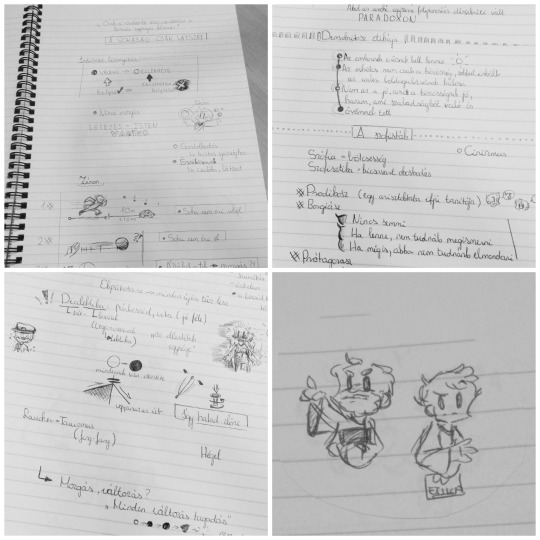
- As for sensory things:
☀️ Let there be light! Sunlight or some lamps with a cozy mood.
💻 "Play" with the settings of your screen, turn down the brightness, the saturation, etc.
👕 If you find it refreshing, maybe take a bath/shower before, or change your clothes to more comfortable ones.
🍃 Let in some fresh air, make sure the room isn't too hot, nor too cold.
🍹 Have a bottle of water by your side, so you don't forget to drink.
🎧 If you need some background noise, there are tons of ambient sound channels on youtube and there's also MyNoiseNet.
🎼 Or put on a music/playlist with only a few tracks looped. Or instrumental music. Or music in a foreign language. Just imagine learning history while some cinematic classical music plays. XD
If you feel bad, here's this site that might help you figure out why.
I plan to make other ADHD and autism posts soon. Till then, *casually salutes* I hope I helped some! :)
2K notes
·
View notes
Text

I drove to campus on city roads instead of the freeway so I could put the top down on my car. I’m meeting with a new friend at the campus coffee shop in an hour, so I brought my art history homework and I’m working on it before she gets here. :) No work or class today, just catch up time before the long weekend!
#back to school#studyblr#studying#study aesthetic#study tips#studyinspo#college#school#study hard#study motivation#studygram#studyspiration#studystudystudy#desksetup#my desk#deskdecor
24 notes
·
View notes
Text
you will feel so alive again.. like so incredibly alive. i dont know when that will be but it will be. u are gonna feel so alive that ur cheeks hurt from smiling oh man oh man i promise that day is coming. you do have a future, you do have good things coming, and you’ll survive everything that’s thrown at you until you reach that day
120K notes
·
View notes
Text
Productivity Issues Log
This YouTube video by How To ADHD (channel by Jessica McCabe) inspired me to make my own Issues Log. For anyone who hasn’t watched it, an issues log is a list you make and add to, and then reflect on later, so you can make your life more executive-function-friendly. Essentially, you notice all the times you don’t do something, and ask yourself why. For example, “I didn’t eat because there were no clean pots,” or, “I didn’t get dressed because there was stuff in front of my closet,” or, “I didn’t do my homework because I watched tv instead.” Becoming aware of all these things lets you then re-organize your environment so that you’re more likely to do your tasks (wash the pot after you use it so it’s ready for next time, make sure your closet is clear, don’t put your remote control in plain site, or move your tv into another room, etc.).
588 notes
·
View notes
Text

Just got through a 3 hour zoom lecture! I’m actually quite enjoying this class so far. He did assign like 3 different readings for the next class, but no class next week because of Labor Day. :)
#back to school#studyblr#studying#study aesthetic#study tips#studyinspo#college#school#study hard#study motivation#studygram#studyspiration#studystudystudy#my desk#desksetup#laptop
180 notes
·
View notes
Text
Task Management:
Creating + Maintaining a Schoolwork Schedule
Key elements
Your schedule suits your individual time/task management preferences.
It is flexible enough to accommodate sudden changes, plus fluctuating energy levels, states of concentration, symptoms and moods.
Daily tasks are not over-whelming; they are small enough that they are achievable.
You do not get “burned out.”
It allows you to be consistent.
Steps to create your schedule
Decide if you want your planner to be paper or digital
Find an “order” that’s logical and achievable for you (more on this later)
Refer to your addendum/syllabus and write down all the assignments, tests and other events taking place that week/month (and their due-dates).
Then break these down, assigning tasks to each day of the week (more on this later).
Break down your tasks even further (more on this later).
Decide if you want to follow a simple daily to-do list or a timed schedule (more on this later).
Find your “order(s)”
Mandatory: Schedule assignments around other commitments (work, social, hobbies, etc.).
Do the hardest task first to get it out of the way (so that the rest of your tasks are less daunting, and because your smaller tasks require less energy therefore can be done even after completing the hard task).
Do the easiest task first to build momentum (give yourself a feeling of accomplishment which will motivate you to continue, and boost your self-confidence early in the day to establish a positive mindset for the rest of the day).
Do the task that’s due first to minimize deadline stress, and so your assignments don’t fall through the cracks (causing you to get discouraged and lose momentum).
Plan according to your energy level throughout the day and week: Do you have Pilates once a week? Maybe you can reserve that day for easier assignments. If you know you’re going to be tired for whatever reason, account for that in your planning.
Consider your state of concentration: If you know you’re too groggy or spaced out for the first hour of your day, you can either schedule easy tasks in that time, or none at all. If you take a medication in the afternoon/evening that makes you tired, schedule easier tasks or none, and get harder tasks done earlier/later in the day. If you have ADHD and crowded places mess with your concentration, but you like studying at a café, go when it’s not busy.
Be mindful of your emotions and symptoms: If you have depression, or are prone to depressive episodes, you’ll need to consider that when scheduling. You might have to rework your entire schedule when you get into a depressive episode (like adding lots of breaks). If suddenly you’re going through a big life event (like a breakup), you need to account for that when scheduling. For instance, if you can’t stand to be alone, maybe you can go out instead of staying in, and if your motivation is low, you may need to up your reward-system or break down your tasks even more.
Break down this week/month’s tasks
Refer to your addendum/syllabus and write down all your due dates for the time period you’re scheduling for.
Based on due dates, outside commitments, predictions of energy/mood/symptoms, assign assignments to the days of the week/month that make most sense for you.
Break down daily tasks into sub-tasks
You can do this (in advance) for your full week/month’s assignments, or do it every morning/evening.
Generally, your assignments will follow a variation of this formula: brainstorm, create an outline, research, write rough draft, edit and revise. Test/exam prep will look something like: check to see what the test is based on, pinpoint important sections, review to see how well you know the material, create a list of items to study, rewrite select notes, make flash cards, study topic 1, study topic 2, etc.
What are the individual components of these steps? Here are some examples. Brainstorm: what should my topic be, what should my thesis be, what points can support my thesis, what do I need to research, what questions do I need to ask my prof? Outline: topic, thesis, points, conclusion. Research: write down all the important parts from each source (separately), then sift through to sort into Supporting Point 1, Supporting Point 2, etc. Rough draft: opening statement(s), intro, point 1, point 2, etc., conclusion, closing statement(s). Edit/revise: read and check for grammar only, then read again and check for spelling only, read again and check for cohesiveness only, etc. Topic 1: Part A, Part B, etc.
Each of these small components can be individual items on your to-do list. Big tasks like, “write essay” are too big for most people. Even “write rough draft” is daunting. If you start with something specific and small like brainstorming, and work your way up, it’s a lot easier to approach. Plus, being able to check off tasks more often and more easily will boost your confidence and your sense of competence, thus building momentum.
Here is a sample to-do list: Research X for Point 1 of Literary Essay, create outline for History Essay, Edit/Revise Assignment 1, study Topic 1 and Topic 2 for Test 1.
To-do list or time-based schedule?
To do list: Write down all your assignments for the day. Put them in the order you want to do them, or go through them intuitively (based on what you feel like doing, or what’s most practical at the time/place you’re at).
Timed-based: Write down all your assignments, then write down the time you’re going to do each of them. You could set reminders or alarms if you want, or simply refer to the list. There’s an awesome app I recommend if this is your thing. It’s called Structured (iOS only).
Curate your study environment for maximum focus
Eliminate distractions such as uncomfortable clothing, sounds (or silence), phone and computer notifications, clutter in the room and on your desk, people who may try to talk to you (shut your door and/or inform them that you’re busy).
Designate a space to doing homework only and avoid spaces that you associate with other things (do not study in bed, as you will want to relax or sleep, and/or you will mess with your sleep by weakening the bed’s association with sleep).
Build associations: Incorporate other events and items into your study/homework routine that you only use while doing that, so that you associate those things with studying/homework (examples: specific playlists, pencils/pens, cups/bottles, scents, rituals, decor, etc.).
Ensure good lighting (preferably including daylight).
Get dressed in clothes that make you feel good about yourself. They don’t have to be “professional” and they should definitely be comfortable. Do not stay in your pyjamas. Believe me, I know this can be hard, and I love PJ’s. But they are not good for productivity.
Don’t “multi-task.” It may feel like you’re getting more done this way, but by splitting your focus, not only do tasks take longer, they also diminish in quality. Commit to the task you’re doing.
Meditate: You can even meditate for just 1-5 mins right before studying, homework and/or classes.
Practice self care (daily!)
Sleep (enough, well, and regularly).
Daylight: Get outside, work by windows, use a light therapy box. These can help regulate your sleep, improve and maintain mental health, and boost energy.
Fresh air: Getting outside even for a couple minutes can help you refresh and reset, and feel good about yourself and your life. Fresh oxygen can help you wake up and is great for your health. Even just opening your window can do a lot for your mood, energy and motivation.
Movement: Try to move at least once per day. The benefits of exercise are numerous and immense.
Healthy and consistent eating: Avoid spikes in insulin levels by eating regularly so you don’t have extreme dips in your energy level. Also, brain power uses calories too, so make sure you’re eating consistently, and try to eat healthy. There are so many other reasons eating consistently is good for your health (and by extension, your productivity).
Relaxation and leisure: Make time for fun and socializing, as well as intentional relaxation. Hobbies, movies/tv, time with friends/family, meditation, baths, progressive muscle relaxation, etc.
Therapy: Your therapy sessions are not daily, but you can do 5 minutes of inner-work per day based on what you and your therapist are currently working on. Working with a therapist is a great way to stay on track with your goals, and develop the skills and positive mindset required for success in school.
Reward yourself
Track progress: Reflect on all the assignments you’ve completed and your grades to remind yourself that you’re capable!
Completing to-do lists daily maintains a sense of accomplishment which keeps your momentum going. Check those items off! Or give yourself gold stars! ⭐️
Treat yourself with non-food rewards: Tie completed school work with fun tasks like video games, or take yourself out for coffee, or some other small (non-food) outing. What I’m trying to do right now is not do my leisure activities until my daily tasks are done.
Develop a positive mindset
Take promises you make to yourself seriously. The more you break promises to yourself, the easier it will get to continue breaking promises. You will lose respect for yourself which lowers motivation, and you will lose trust in yourself which can become debilitating as well. The more you keep promises, the easier it will get, the more motivated you’ll become, and the more you’ll trust and respect yourself. Your confidence will improve, and you’ll feel better about yourself. Productivity is choosing yourself. Discipline is choosing what’s best for you instead of what you feel like doing in the moment. Discipline is a muscle, and like any muscle, it can be strengthened, and it can atrophy.
Remember your “why.” What is the end goal of being in school? What’s your career path, and why did you choose it? What will your life be like when you have that career? What would your life be like if you gave up and didn’t make it to your goal? Aiming for your dream while running from your nightmare is a great strategy for maintaining motivation. Lighting a fire under your *** can be a huge motivator.
Remember how good you feel when you get schoolwork done, and let this motivate you to stay consistent. You can also remember how you feel when you don’t get work done, but definitely focus more on the positive!
Go to therapy and/or hire a coach. There are SO many benefits to therapy and I’d honestly need a whole other post to get into it. You don’t need to be depressed or mentally ill at all in order to benefit from talking to a therapist. They can even help you with time management, procrastination, motivation and more! If you can afford it, please do it. It’s such a worthwhile investment.
Be consistent
No “zero days.” Do at least a bit of homework or studying every day so you don’t slip into vacation mode. Make schoolwork a daily part of your life, so it just becomes the norm.
Build productivity momentum (track progress, check items off your to-do list daily, treat yourself, keep promises to yourself, remember your “why,” remember how success feels).
Stay on top of projects. Your assignments are made up of smaller tasks you assign yourself across time. “Success is the sum of small efforts repeated day in and day out.” - Robert Collier
Avoid burnout (more on this later).
Keep it interesting (more on this later).
Avoid burnout
Self-care: shower and/or bathe regularly, maintain proper sleep habits, stay hydrated, take care of your skin, do relaxation activities like meditation and reading, do fun activities, pamper yourself every now and then with face masks or foot baths, take your meds as prescribed, eat well and regularly, get outside often, move daily, etc.
Break up study/homework sessions into small, manageable chunks of time, with constructive (refreshing) breaks in between.
Break assignments down into even smaller tasks so that you aren’t over-working yourself during the course of a day, and so that you don’t overwhelm yourself (the stress can lead to burnout).
School-life balance: Keep up with your social life as best as you can, make time for your hobbies, maintain self-care, say no to things that don’t serve you, etc. Try to follow through with scheduled schoolwork 100% of the time, but know that you won’t. Sometimes you’ll need to prioritize mental health over schoolwork (be careful though, this is a very fine line, and a slippery slope). Sometimes things will come up and it’ll be out of your control. But more than anything else, there will be times when you just decide to prioritize something else like fun and socializing over schoolwork. This is why your schedule needs to be flexible: to accommodate sudden invites to hang out and random decisions to skip a homework/study session, but more importantly, flexibility will reduce the odds that you’ll skip in the first place. If your schedule includes hobbies and socializing, and anything else that’s important to you, then you won’t feel deprived. If you have school-life balance, you’ll have more of yourself to devote to schoolwork when it’s time to.
Keep it interesting
Romanticize your life by putting effort into making all of your daily tasks a special occasion.
Make meals and drinks special by using your favourite dinnerware and cutlery. Perhaps even incorporate extra elements such as: a beautiful tablecloth, napkins, candles and/or dim lighting, music, wearing your favourite clothing, etc.
Pretend you’re the main character in a movie about a successful, productive student (because you are the main character in your life).
Make games out of studying if this is something that interests you (the Forest app comes to mind).
Use lots of colours in your notes and buy colourful stationary! 🌈
Vary your approach/methods if needed to avoid boredom.
Study with friends (online or in person).
Reward yourself often.
Remember your “why.”
3K notes
·
View notes
Text

Studying on the floor with the sliding door open for a change of scenery. It’s gorgeous outside, but I don’t feel like driving anywhere that I can actually be outside so this will have to do.
My poor math textbook being used as a coaster… It was $5 on Amazon and the only not-$100 flat surface I had, so it had to be sacrificed.
#back to school#studyblr#studying#study aesthetic#study tips#studyinspo#college#school#study hard#study motivation#studygram#studyspiration#studystudystudy#deskdecor#desksetup#my desk
13 notes
·
View notes
Text
Got sick last night and did basically nothing productive all day. I know it’s important to let yourself rest when you’re sick, though.
#studygram#studystudystudy#back to school#studyblr#studying#study aesthetic#study tips#studyinspo#college#school#study hard#study motivation#studyspiration
0 notes
Photo
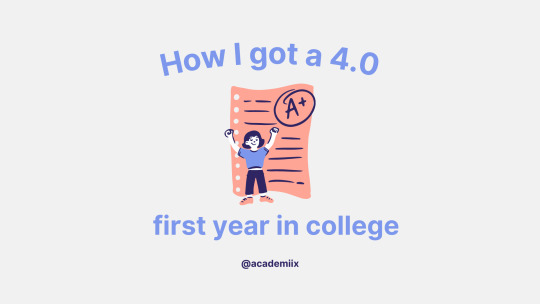
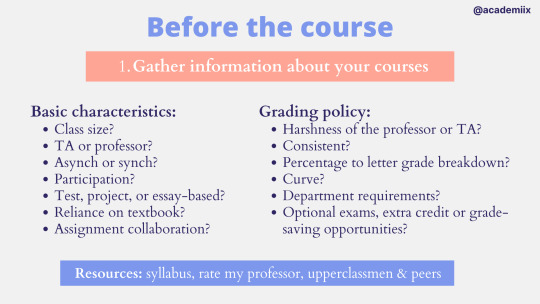

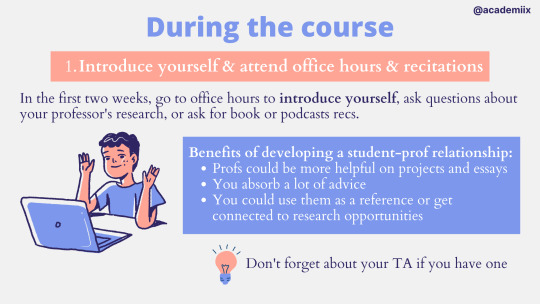
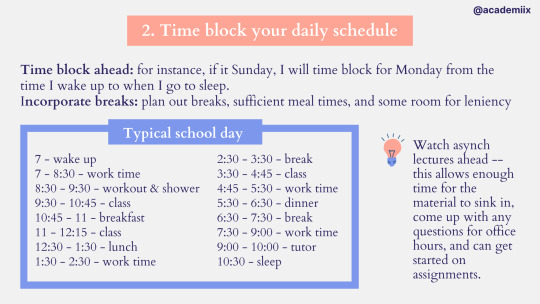
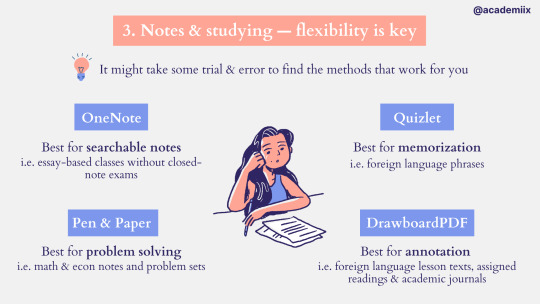
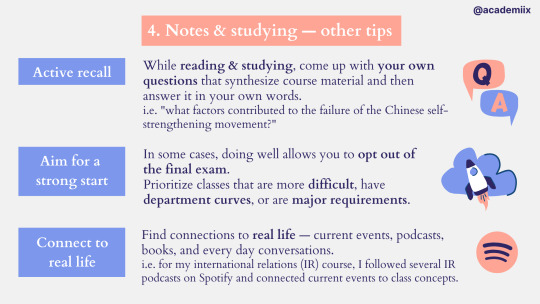
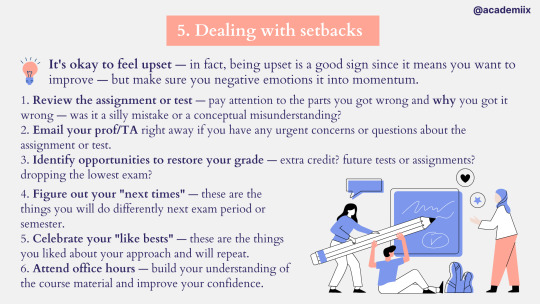
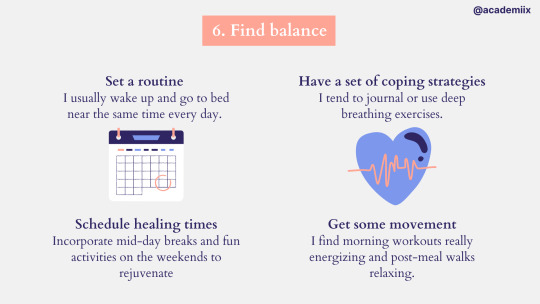
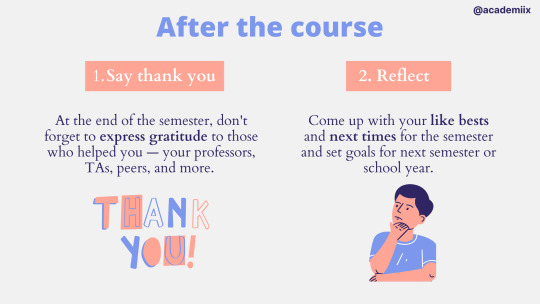
How I got a 4.0 first year in college | academiix
Watch the video version on Youtube.
View my other tips and masterposts.
6K notes
·
View notes
Text
Surviving college
I saw a really helpful post by @daisystudies about tips for college (link to post) and I felt inspired to share some things I learnt during my first year:
Commute will get easier - If you live close enough to your college, that you don’t have to move there, but far enough for it to be a long commute, I promise it’s worth it and it gets easier. Make sure to research ways to make commuting cheaper especially for students (most countries offer long term tickets for cheaper).
Everyone is just as lost as you are - Not even the older students are much wiser trust me.Being confused and stressed is super normal! It’s a big change, but you’ll adapt and it will get easier.
Everybody is lonely and everyone wants to make friends - People do not want to be alone and they will want to talk to you. Everyone seeks a companion and they are opened to a conversation. If you’re not brave enough to start talking to strangers (that’s okay) just try to look opened to talking to someone. Smile a bit, don’t spend all of your time staring into your phone, take part in class. I promise people aren’t as terrifying as they seem.
Professors who try to scare you are assholes and are not worth to stress over - I meet two types of professors: those who try to encourage students and those who are proud of their class being difficult. My very first lecture started with the professor listing reason why we don’t deserve to be there, which was scary. I later realised that people like that are not worth my attention. I promise you will meet great professors who will feel like mentors and will help you.
You’re largerly on your own - I know this sounds awful but stick with me for a second. In high school you are told all deadlines, reminded of important tasks and you get a very rigid schedule. In college it’s up to you to look up deadlines, find all necessary requirements and sign up for exams. This will be stressful at first but it also offers far more freedom and often allows you to do things on your own schedule.
Physical health and activity is way more important than you think - I beg you to move your body at least 3 times a week. Walk, do yoga, stretch, do sports, go to the gym - anything. Just make sure you don’t neglect your body just because of a busy schedule. It can and will do more damage than you might think.
College social life is a bit over romanticised - This might be the covid era student in me speaking but I still feel it’s important to mention. It won’t be like you see in shows and movies. Doesn’t mean it’s never fun… but still make sure not to expect the greatest years of your life. Best case scenario: you’ll be pleasantly surprised.
Get a light laptop - this depends on what you study, but most majors do not need you to have an expensive computer. It’s just better to have something to have all your notes on and a lot of classes are so fast paced it’s impossible to hand write without having to go back and fill in large amounts of information, which in turn takes a lot of extra time.
Your mental health is not worth sacrificing for good grades or even a finished degree - Please set your priorities right in the beginning. Your health is the most important thing you have. You can always live an amazing life without a degree but not without your health.
685 notes
·
View notes
Text
what i've learned from one year in uni
...as a humanities student focussing on languages and history.
do all your readings at least a week in advance. honestly a lifesaver. make a list of the readings you'll need to have done for the next week and divvy them up along the current week.
annotate your readings. either by hand, or download them, import to a pdf annotation app (or just google drive) and make comments/highlight important parts,
don't sign up for early or late classes, especially if you're a commuter. i signed up for a 9-11 AM class and a 6-8 PM class and they were both hell even if I enjoyed the material. Don't do it.
join the class group chat. if there isn't one, make one. you might not think you need it, but you do, you really do.
if you can't get yourself to do the whole reading, read the first sentence of every paragraph. listen, we've all been there when the reading is 36 pages and you're just not feeling it. most well-written academic articles start with a topic sentence that will give you a sense of the general direction of the work, so skimming the first sentence of each paragraph can actually equip you better than nothing for your discussions.
the syllabus is your bible. read it THOROUGHLY at the beginning of term and reference it CONSTANTLY.
skip lectures. NEVER skip tutorials. it's better to not skip lectures either but sometimes they're just not helpful. but ALWAYS go to tutorial.
find out your task capacity and worship it. i can't allocate myself a certain number of hours of work a day because sometimes i can work for 10 hours and sometimes i can barely focus for two. however, i can generally manage around 5 academic tasks a day. so I'll allocate myself two readings, an outline, a draft and a note-taking session and that works pretty well for me.
919 notes
·
View notes